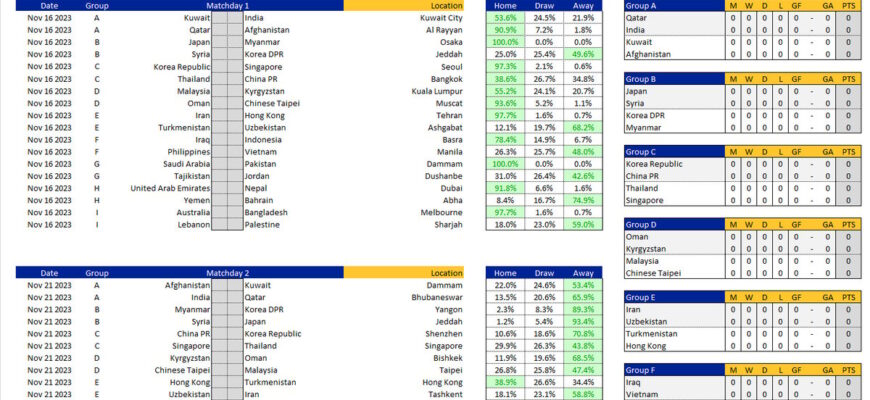The world of international football is a ceaseless cycle of anticipation, competition, and strategic maneuvering. As the second major international break of the 2025-26 season unfolds, the gaze of the global football community is firmly fixed on the horizon: the expanded FIFA World Cup 2026, set to ignite North America. This period is far more than a mere pause in league play; it is a critical juncture where ambitions are forged, pathways to qualification are carved, and the intricate tapestry of global sport is woven, sometimes revealing threads of geopolitical complexity.
The Early Birds: A Glimpse at the 2026 Contenders
With the monumental 2026 tournament expanding to 48 teams, the race for a coveted spot is fiercer than ever. While many nations are still locked in grueling qualifying campaigns, a select few have already punched their tickets. The three gracious hosts – the United States, Mexico, and Canada – automatically secure their berths, granting them the luxury of focused preparation rather than qualification battles.
Beyond the hosts, a diverse contingent of 15 nations has successfully navigated their initial qualifying hurdles, representing a broad geographical spread:
- Asia (AFC): Japan, Iran, Uzbekistan, South Korea, Jordan, Australia
- Oceania (OFC): New Zealand
- South America (CONMEBOL): Argentina, Brazil, Ecuador, Paraguay, Uruguay, Colombia
- Africa (CAF): Morocco, Tunisia
These early qualifiers highlight the varying stages of continental competitions. While some regions have already seen significant progress, others, particularly in Europe, are only just hitting their stride. The grand draw, slated for December 5th at the Kennedy Center in Washington D.C., will undoubtedly heighten the excitement, even though the final roster of participants will remain incomplete until the decisive playoff matches in March 2026.
USMNT`s Unique Position: Building Momentum, Not Chasing Points
For the host nations, this international break presents a distinct opportunity. Unlike teams scrambling for qualification points, Gregg Berhalter`s USMNT is afforded the invaluable chance to refine tactics, experiment with lineups, and build crucial team chemistry ahead of their home tournament. Recent results have offered a mixed bag, with a Gold Cup final loss to Mexico and a friendly defeat against South Korea, juxtaposed with a recent victory over Japan.
This period of non-competitive fixtures against formidable opponents like Ecuador and Australia is not merely about winning; it`s about cohesion, adaptability, and instilling a winning mentality. It’s an unusual luxury, a strategic pause designed to cultivate a squad capable of making a profound impact on home soil. The momentum generated now could prove invaluable when the world descends upon North America next summer.
Beyond the Pitch: Geopolitical Echoes in the International Arena
However, the narrative of international football is not always confined to athletic prowess and tactical brilliance. This break has once again underscored how global events can inextricably intertwine with the beautiful game. The ongoing Israel-Hamas conflict has led to calls from a group of United Nations experts for FIFA and UEFA to suspend Israel from international competition. While a short-term ban appears unlikely, the situation serves as a stark reminder that sport, ideally a unifying force, is seldom entirely immune to the complexities of global politics.
Israel`s upcoming matches, particularly against Italy, are anticipated to draw protests, highlighting the sensitive nature of these intersections. The very venues designed for sporting celebration can become inadvertent stages for expressing profound geopolitical sentiments. It`s a poignant, if perhaps unwelcome, layer to the competition.
Key Matchups to Watch This International Break:
For those eager to witness the unfolding drama, several fixtures promise high stakes and compelling narratives:
- United States vs. Ecuador (Friendly) – A test for the USMNT`s ongoing development.
- Honduras vs. Costa Rica (WCQ) – A crucial CONCACAF qualifier with significant implications.
- Spain vs. Georgia (WCQ) – European powerhouses battling for their place.
- Italy vs. Israel (WCQ) – A match under a spotlight beyond just the scoreline.
- United States vs. Australia (Friendly) – Another opportunity for the USMNT to hone its game against international opposition.
As the international break progresses, the journey to the FIFA World Cup 2026 continues its multifaceted evolution. It is a spectacle defined not only by the skill on the field but also by the strategic decisions off it, the passionate support of nations, and the often-unforeseen influence of the wider world. The countdown to June 2026 has well and truly begun, promising a tournament that will be remembered for its scale, its stories, and its indelible impact on the global stage.









